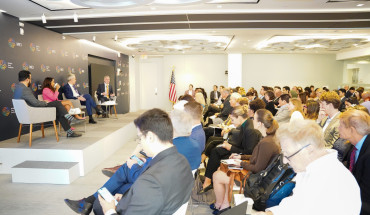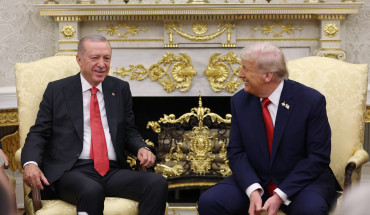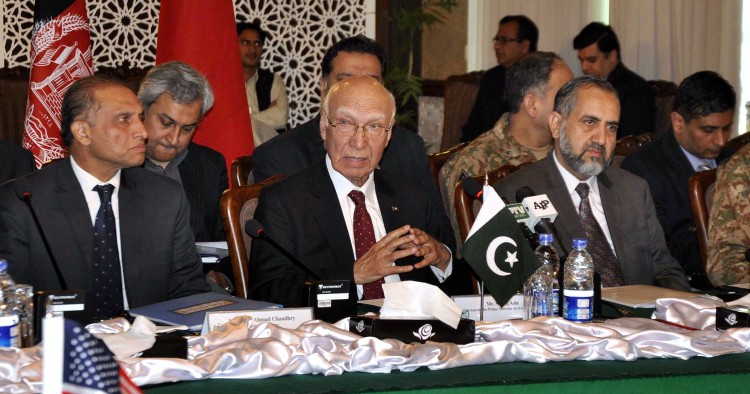This article was published on February 5, 2016 on Foreign Policy's South Asia Channel.
Hopes for reviving the Afghan peace process have risen once again. Meetings on Jan. 11 and Jan. 18 in Islamabad and Kabul brought Afghan and Pakistani officials together with representatives from the United States and China in order to chart a path toward resuming peace negotiations. Discussions with the Taliban broke off in early July when Afghan sources revealed that the insurgency’s spiritual leader, Mullah Omar, had been dead for two years. It was with Omar’s supposed blessing that Mullah Akhtar Mansour, his second-in-command, participated in the Pakistan-hosted July meeting. Mansour’s cover-up of Omar’s death reportedly angered many within the Taliban’s senior command, and his self-appointment as successor brought about challenges to his leadership, including those from his chief rival Mullah Mohammad Rasool. A harried Mansour then backed out of a second round of talks.
The Taliban was notably absent from the two quadrilateral discussions intended to restart the negotiations. Despite some positive signs, there is no assurance that any senior leader will attend the next round of talks scheduled for Feb. 6, or that any participants can speak for the now fragmented Taliban movement. Mansour’s rivals include several who are firmly opposed to negotiations and are determined to achieve military victory. Their resolve has undoubtedly been strengthened by the steady setbacks suffered by government forces in what is usually the offseason for violent battles, and exemplified by the steady gains made by the Taliban in Helmand province. Reportedly, one-third of the country’s almost 400 districts are contested or under insurgent control.
Although the Mansour faction has retained its political office in Qatar, its field commanders show no interest in curtailing their attacks in the interest of negotiations. Nor has Mansour seemed anxious to join in peace talks. On Jan. 24, his spokesman at an international conference in Qatar did not budge from the Taliban’s long-standing set of preconditions for entering negotiations, including demands that all foreign forces must first leave Afghan soil and Taliban prisoners be freed. Mansour was also reported on Jan. 7 to have expelled two senior members of his leadership council who had been part of a team slated to participate in the aborted talks in July.
Still, the disarray within the Taliban’s leadership could improve the chances for negotiations. By entering talks, participating Taliban leaders may see an opportunity to gain factional advantage through the international recognition they receive. Leadership divisions may also allow Pakistan to increasingly lean on those elements of the insurgency over which it has some influence. But thus far, presumptive Taliban pragmatists have shown no signs of softening their demands or yielding to appeals from Pakistan to negotiate.
President Ashraf Ghani’s political problems may also impede peace negotiations. Although supportive of the latest diplomatic initiatives to revive talks, he is still recovering from popular suspicions that he betrayed Afghan interests with his conciliatory approaches to Pakistan. Ghani’s domestic critics continue to doubt Pakistan’s sincerity in pursing negotiations. Additionally, critics in Afghanistan fear an agreement could compromise political and social progress from the last 14 years. As a response to his critics, Ghani, in a Dec. 28 meeting with Pakistani army chief Raheel Sharif, insisted that any new talks must be clear on three points: Afghans need to feel confident that Pakistan is cooperating honestly in regards to the peace process; any agreement must protect Afghanistan’s democratic institutions; and Taliban participants must represent their respective groups and not a parallel Afghan government.
Pakistan may overcome Afghan doubts about its intentions, but the other two declared red lines involving democracy and Taliban identity are more daunting. The Taliban, for whom state legitimacy rests on having a government strictly compliant with Sharia law, has long expressed its contempt for the Afghan political system, specifically its democratic elections and constitution. Taliban interlocutors are also unlikely to disavow their identification with an Islamic Emirate, as became clear at the Pugwash conference. Ghani has set yet another condition by saying that Afghanistan would refuse to negotiate with any group it considers terrorists. However, the Kabul government contradicted this stance at the January Islamabad meeting, appearing to go along with a Pakistani proposal that all groups should be allowed to participate in negotiations without preconditions in peace talks.
The door must always remain open to serious Taliban peace overtures. Yet, the relentless search for Taliban peacemakers carries notable drawbacks. The most obvious concern is that negotiations will unavoidably confer legitimacy on a movement that has long coveted international approval. Formal talks also stand the danger of confounding for undecided Afghans whether the Taliban is the enemy or a negotiating partner. Afghan government officials, including both former president Hamid Karzai and Ashraf Ghani, have further sowed confusion by referring to Taliban members as “brothers” in efforts to draw their leaders into negotiations.
The very prospect of negotiations has led the United States and its allies to pull their punches politically and militarily against mainstream Taliban leadership within Pakistan. Washington has never placed the Taliban on the list of Designated Foreign Terrorist Organizations, which mandates sanctions, and it is no secret that while targeting the Haqqani Network, ISIS, and other militant groups with drone strikes, the United States has spared the Quetta-based Taliban. While pressing Pakistan to end its practice of differentiating between its good and bad extremists, Washington appears to want Islamabad to distinguish those Afghan insurgents liable to join negotiations from those it wants killed.
Negotiating and fighting simultaneously is a time-honored strategy. One can obviously leverage the other. But when the strategy is taken from a position of growing weakness, it is more likely to be used to stave off defeat than to facilitate compromise. The Taliban easily interprets the eagerness of the Kabul government and its international backers to begin talks as evidence of their desperation.
But should some Taliban factions finally decide to attend peace talks, anyone pinning hopes on an early end to fighting through a grand political deal should bear in mind that negotiations in far less complex conflicts have, as a rule, stretched over years. A full appraisal must further consider that without reversing the deteriorating military situation, the Taliban and not the Afghan government will hold the bargaining advantage. And even were an agreement negotiated, there is reason to doubt its winning broad acceptance and having effective mechanisms of enforcement. Realistically, the Afghan conflict’s eventual outcome will most probably be decided on the battlefield.
The Middle East Institute (MEI) is an independent, non-partisan, non-for-profit, educational organization. It does not engage in advocacy and its scholars’ opinions are their own. MEI welcomes financial donations, but retains sole editorial control over its work and its publications reflect only the authors’ views. For a listing of MEI donors, please click here.













